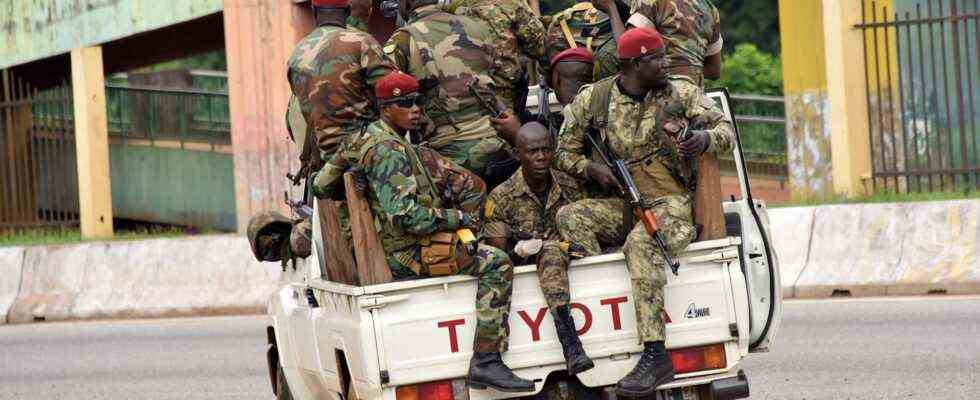Status: 06.09.2021 02:20 a.m.
Gunfire, military vehicles, curfew: The President of Guinea, Alpha Condé, is said to have been overthrown. The exact circumstances are unclear, but other countries are appalled and demand his release.
International criticism of the alleged coup attempt in West African Guinea is growing louder. After UN Secretary General António Guterres had condemned “every takeover of government by force of arms”, the European Union, the African Union, the former colonial power France and Great Britain also publicly expressed criticism. The exact background and circumstances of the turbulent events on Sunday were not yet unequivocally clarified on Monday night.
According to the British Embassy in Conakry, there had been ongoing exchanges of fire in several locations in the capital over the course of Sunday. Non-verifiable videos initially circulated on social media suggesting that President Alpha Condé had been overthrown. A video with the state broadcaster’s logo featured several men in military uniforms and with the national flag – one of whom claimed the government had been deposed. He also said the constitution has been repealed and the country’s borders are closed.
Military on the streets
Videos are also circulating on social media. On them you can see: mostly heavily armed and partly disguised military men – as well as the 83-year-old President Condé in a colorful shirt and jeans sitting on a sofa. When asked whether he had been tortured, the head of state remains silent. The whereabouts of the president was initially unclear.
The French-language broadcaster “TV5” Monde and other media reported that the Ministry of Defense of Guinea said on Sunday afternoon that insurgents had been repulsed by the Presidential Guard and other security forces. An eyewitness told the “German Press Agency” that the situation was very tense. There were firefights, especially near the presidential palace in the Kaloum district. The military is said to be patrolling the streets of Conakry.
President Condé came to power in Guinea in 2010.
Image: AP
International protests
In the evening, a curfew was announced on the television news. The government ministers should be removed and the heads of the regional administration replaced by the military. Officials were called to return to work on Monday. The deposed ministers and presidents of the various government institutions should come to a meeting on Monday morning – otherwise they would be guilty of the “rebellion”.
UN Secretary General Guterres called on Twitter on Sunday evening for the president to be released immediately. British Ambassador David McIlroy and EU Foreign Affairs Representative Josep Borrell made similar views. Borrell appealed to everyone to act according to the rule of law for the sake of peace and for the good of the Guinean people. The former colonial power France also condemned the attempt to take power by force and demanded a return to constitutional order and the immediate and unconditional release of Condé.
Controversial constitutional amendment
According to media reports, the rebels are led by Mamadi Doumbouya, the commander of a special unit. In another unverified video, he named among other things the instrumentalization of the judiciary, looting of state revenue and corruption in Guinea as reasons for the removal of Condes. Videos circulated on social media in which residents of Conakry cheer and applaud the patrolling soldiers.
President Condé came to power in 2010 in the first free democratic election since Guinea’s independence in 1958. Reforms in the economy and in the military are ascribed to him, and after politically turbulent decades he also ensured more stability. Critics, however, see Condé as an increasingly authoritarian ruler whose term of office was marked by human rights violations. Last year he secured a third term in office after a controversial constitutional amendment. The vote was preceded by months of political tension and violent protests.
With information from Dunja Sadaqi ARD-Studio Nordwestafrika

